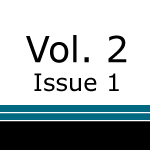Volume 9.1: Introspection
Present Tense Volume 9 Issue 1 arrives as the country begins its cautious emergence from its pandemic quarantine. Yet, the term “quarantine” obfuscates the important social and political activity that continued throughout the quarantine in response to incidents of police brutality and the rise of white nationalism. Others have provided far better analysis and commentaries on the consequences of the past year than we dare attempt in this issue introduction; however, it seems worth mentioning that even our small area of the world—rhetoric and writing studies—is coming to terms with its history of racist, sexist, and ableist practices. Such introspection, while painful, is necessary and important work, and we hope Present Tense can serve as an ally and change agent as we collectively reimagine and revise the trajectory of our discipline.
This issue is our first as managing editors—an exciting and humbling moment—and one that marks a number of changes here at the journal. First, we welcome Ehren Pflugfelder and Megan Schoen, outgoing managing editors, into new roles: Editor-at-Large and Style Editor, respectively. Like many you, we have turned to Present Tense over the years as a source for thoughtful rhetorical analysis on contemporary issues, and, therefore, we join our readership in thanking Ehren and Megan for their tireless stewardship of the journal’s mission and vision. Present Tense enters its second decade of existence at a time when independent, peer-reviewed journals are needed more than ever. We are excited about the changes rolling out over the next year, but we are committed to holding true to Present Tense’s founding vision.
Next, we say goodbye to long-time book review editor, Ryan Skinnell. Not only has Ryan curated an exceptional list of book reviews over the years, elevating Present Tense’s reputation as a place for discerning readers, but he has also created a warm and welcoming environment for new and emerging scholars to enter into the work of public scholarship by providing thoughtful guidance and encouragement throughout their writing process. While we will miss Ryan, we believe our field as a whole will benefit from the time now available to him to pursue new endeavors and scholarly projects.
As beloved members of the editorial team step into new opportunities and away from Present Tense, we are excited to welcome two new members to the Present Tense team. Dr. Jennifer LeMesurier (Colgate University, Department of Writing Rhetoric) will serve as the new Book Review Editor. Dr. Dana Comi (University of Alabama—Montgomery) will serve as the journal’s Technical Editor. We look forward to working with both Jennifer and Dana, and we are certain their energies and expertise will shape the journal in positive ways.
Reflecting on the changes before us, we believe this issue also serves as an opportunity to define our ongoing goals for Present Tense. Or, perhaps more accurately, this is an occasion to reiterate the ethos that has animated the journal since its launch over a decade ago. Namely, the notion that a highly selective, peer-reviewed academic journal can and should contribute to the professional development of scholars through a mentorship-informed approach to editorial practices. From our initial communication with authors to the comments authors receive from reviewers, we want the editorial processes of Present Tense to reflect the generous and collaborative spirit we believe is one of the hallmarks of our field.
We want every author that submits to Present Tense, regardless of whether their work is published in the journal, to walk away from the process encouraged and energized because of the meaningful interactions with reviewers and editors whom provided careful and thoughtful responses to their work. For years, Present Tense—given its focus on contemporary discussions of culture and theory—has served as a weathervane, providing insight into the direction of research in our field. We believe Present Tense will continue to serve this function; however, we also want Present Tense to serve as a model for academic publishing where collaboration and generosity usurp competition as the primary editorial ethos.
While no single journal can cure the myriad of aliments that currently plague our culture and field, we hope to serve as an ally for all of those working for the causes of justice and equity in both the classroom and the marketplace. Thank you to all who continue to find their way back to Present Tense; we are grateful for your continued support and look forward to the next stage in the life of this academic community.
Volume 9, Issue 1 features the following works:
Renea Frey’s article “’How Dare You’: Greta Thunberg, Parrhesia, and Rhetorical Citizenship” considers “Thunberg’s speech within the context of democratic deliberation, citizenship, and the practice of parrhesia, the rhetorical tradition of speaking truth to power within the public sphere, especially when doing so is risky,” suggesting that “theorizing Thunberg as a parrhesistic citizen who deliberates on issues of public importance challenges assumptions about the exclusion of non-adults as legitimate members of policy discourse and debate.”
Vani Kannan’s “Hate Crimes & the Contradictions of ‘Brownwashed’ Conservatism” tackles ‘brownwashed’ conservatism in the aftermath of the Trump era” and how “rhetorics of acceptable difference perpetuate ideologies that make racist, violent acts possible.” Kannan suggests that “’brownwashing’ is dividing and conquering communities that might otherwise be committed to identifying and dismantling logics, rhetorics, and material consequences of white supremacy.”
In “’The People are the Plague’: Rhetorics of Blame During COVID-19,” Aimee Rickman and Alexandra J. Cavallaro argue that “a rhetoric of blame . . . shifts focus away from social structures and toward blaming individuals for social problems. This rhetoric has a long history, but in a COVID-19 world, it comes together as a by-product of a rhetorical process called “panopticonning.'” They further argue that “rhetoricians are uniquely positioned to interrogate and bring attention to [such] realities.”
Adam Hubrig’s “Fear and Loathing—of Disability on the Campaign Trail” analyzes the “ableist rhetorical framing of disability in the 2020 campaign trail” and how it “has predominantly been used to delegitimize candidates for alleged disabilities—and in doing so, has contributed to an ableist project further stigmatizing disabled people and situating them as outside of the possibility of democratic agency.”
Sara West and Adam Pope’s “Rubles and Rhetoric: Corporate Kairos and Social Media’s Crisis of Common Sense” engages in the explication of “corporate kairos” and how “platform politics and technological dynamics at play on Facebook . . . allowed Russian politically motivated advertisements to be purchased with Rubles during the 2016 election season.” More specifically, they suggest, “as teachers of writing and communication and online texts in particular, we need to impress on our students how to critically engage with texts that are primarily placed in front of them via corporate kairos, and how to trace the origin and motive of these texts on platforms that often go to great lengths to hide this vital information.”
In “Intervening in #Access2Care: Towards a Rhetorical Framework for Relational Advocacy,” Maria Novotny interrogates “tensions within advocacy campaigns, like #Access2Care, which seek to improve access to healthcare, yet, at times operate within an advocacy framework that fails to listen to the very subjects they seek to empower.” As an infertility advocate and rhetorician, Novotny outlines a four-pronged approach to relational advocacy.
Anne Melfi, Nicole Khoury, and Tarez Samra Graban curated An Annotated Bibliography of Global and Non-Western Rhetorics: Sources for Comparative Rhetorical Studies. This comprehensive annotated bibliography “bears witness to a robust literature that is not so much new as it has been emerging for several decades under one of several monikers: ‘comparative,’ ‘global,’ and/or ‘non-Western,’” offering “a concise compendium of global rhetorical resources that offer[s] new avenues for studying and teaching communication in postcolonial and decolonial contexts, and around which we c[an] build or revitalize our curriculum.”
Roger Chao reviews Dana Cloud’s Reality Bites: Rhetoric and the Circulation of Truth Claims in U.S. Political Culture.
Tolulope Odebunmi reviews Mark Hlavacik’s Assigning Blame: The Rhetoric of Education Reform.
Alison Wells Zepeda reviews Debra Hawhee’s Rhetoric in Tooth and Claw: Animals, Language, Sensation.
We hope you enjoy reading/viewing these works and sharing them with colleagues and students in the months and years to come.
Jessica E. Clements, Managing Editor
John Pell, Managing Editor
Shreelina Ghosh, Multimedia Editor
Matt Cox, Annotated Bibliography Editor
Don Unger, Social Media Editor
Ryan Skinnell, Review Editor
Megan Schoen, Style Editor
Cristyn L. Elder, Style Editor
Ehren Helmut Pflugfelder, Editor-at-Large
Caitlan Spronk, Technical Editor
Joshua Prenosil, Business Editor
COVER IMAGE CREDIT: “Spectrum Introspection” by huw-ogilvie is licensed under CC BY 2.0



